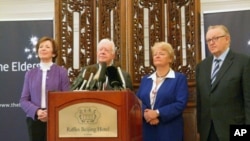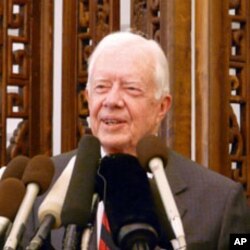A group of internationally prominent figures, known as the Elders, is seeking to ease tensions on the Korean peninsula and draw attention to the ongoing food shortages in North Korea with a trip to Pyongyang.
Former South African president and Nobel Peace Laureate Nelson Mandela founded the Elders in 2007. The group is made up of global leaders who no longer hold public office and who work together to support peace and human rights.
Former American president and Nobel Peace Laureate Jimmy Carter is leading this Elders delegation to Pyongyang.
"We received our invitation from the top leaders in North Korea, and I can’t identify which ones, I don’t think that’s important. But the Elders, as a group, were asked to come, to learn what we can about the situation of humanitarian concerns on the ground."
Carter spoke to journalists in Beijing Monday. He said the delegation also will discuss North Korea’s nuclear program in meetings with leaders in Pyongyang.
"The Elders are not in a position to negotiate, we’re not mediators. We’re going to learn what we can and share what we find with the leaders with whom we have contact in the future," he said.
Carter said he is not sure who his group will meet with in Pyongyang, but said he would welcome meetings with North Korean leader Kim Jong Il or his son and heir apparent, Kim Jong Un.
Tensions have risen on the Korean peninsula since a suspected North Korean torpedo sank a South Korean warship about a year ago and since the North shelled a South Korean island late last year.
China has been actively pushing for a resumption of six-party talks on the Korean peninsula, which have not been held for two years.
Other Elders on the trip include Gro Bruntland, the former prime minister of Norway and former head of the World Health Organization, as well as former Finnish president Martti Ahtisaari, who is also a Nobel Peace laureate.
Elder Mary Robinson is a former president of Ireland and the first United Nations High Commissioner for Human Rights. She says food shortages and malnutrition in North Korea are a major concern.
"There are about three point five million [children] who are vulnerable, who face, potentially, very severe food shortage. They’re now lowering the calorie intake for the population, below what is really tolerable for a population, and we’re really concerned about it," Robinson said.
The Elders go to Pyongyang Tuesday, and then to Seoul on Thursday.
When Carter visited Pyongyang in August, he brought back an American citizen detained there for illegal entry. There are hopes this time he can secure the release of a Korean-American who is being held in North Korea for illegal religious activities.






